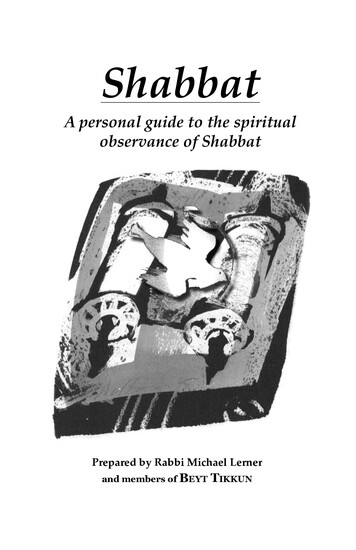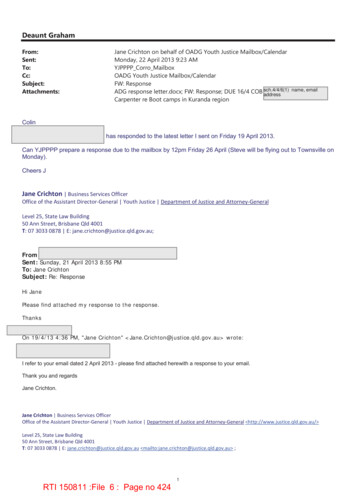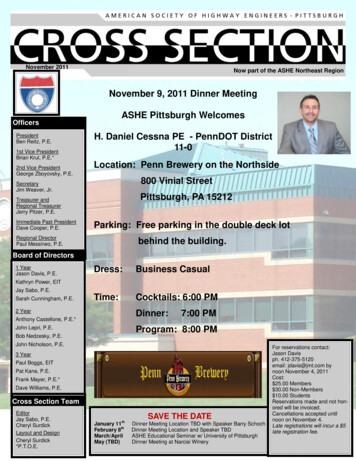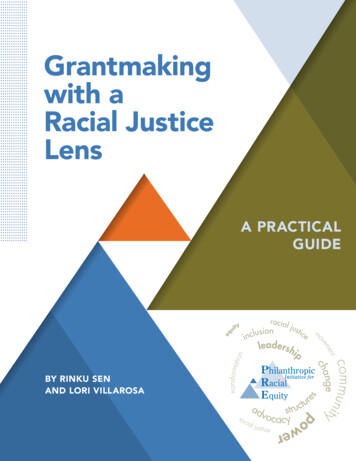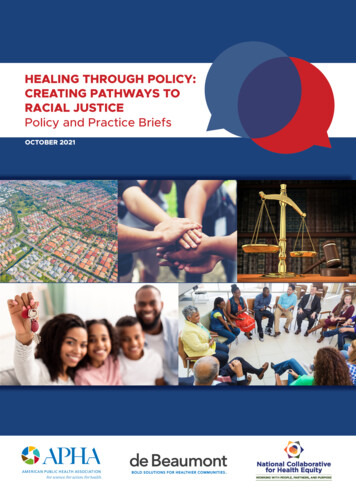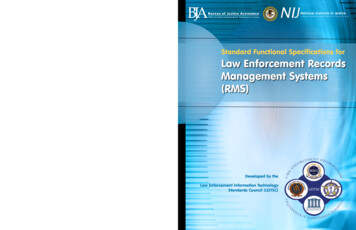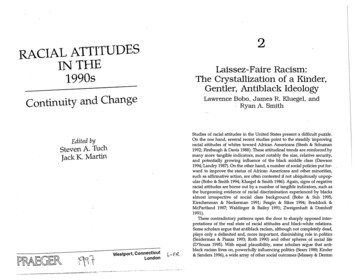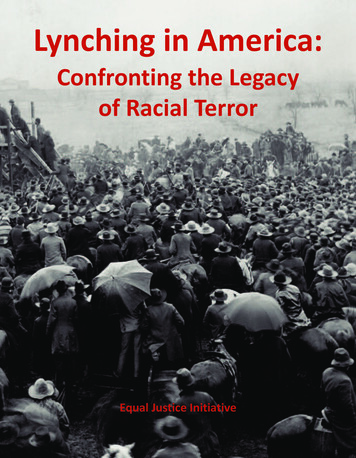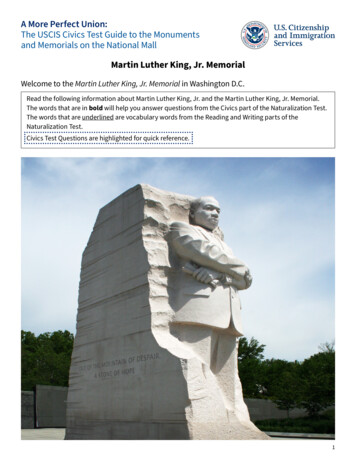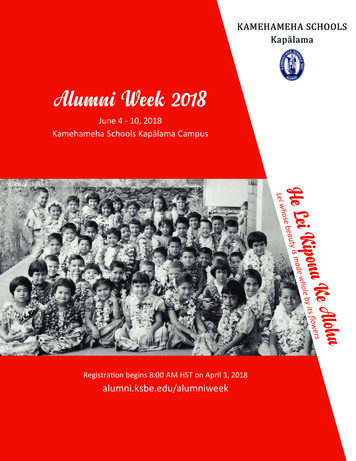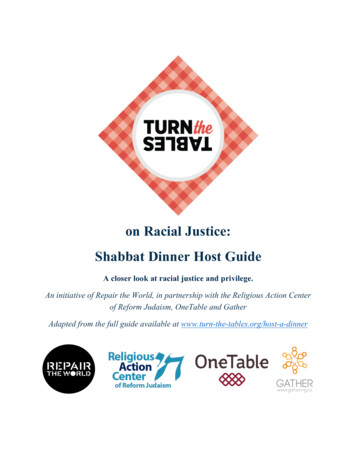
Transcription
on Racial Justice:Shabbat Dinner Host GuideA closer look at racial justice and privilege.An initiative of Repair the World, in partnership with the Religious Action Centerof Reform Judaism, OneTable and GatherAdapted from the full guide available at www.turn-the-tables.org/host-a-dinner
WELCOME TO TURN THE TABLESDEAR HOST,The following guide is the result of a partnership between Repair the World and the Religious Action Center of ReformJudaism (RAC). Repair the World is a national nonprofit that mobilizes Jews to give time and effort to the causesthey’re passionate about. The Religious Action Center is the DC office of the Union for Reform Judaism and thehub for Reform Jewish social justice and legislative activity. On behalf of both organizations, we want to THANKYOU for joining us in honoring the legacy of Dr. Martin Luther King Jr. by hosting a Turn the Tables on RacialJustice Shabbat Dinner as part of Points of Light’s MLK Day Sunday Suppers (http://bit.ly/1aG3y12). On January15, 2016, you will join thousands of people across the country in dining together and engaging in important dialogueabout issues of racial injustice impacting communities and specifically our education system.Racial injustice undermines hope, squanders potential, devastates communities and costs lives. We believe that racialjustice must be addressed with a variety of approaches, namely reflection, relationship-building and reform. Werecognize that service can play a critical role in all three by relating with others across contexts, by serving as a wayto act in solidarity with (and not for) your community, by disrupting some of the systems that reinforce inequity andby addressing urgent short-term needs that broader efforts may neglect to rectify. We do service to build solidaritywith our neighbors and with marginalized communities, among Jews, among non-Jews and among the increasingnumber of Jews of color. Service, done right, can support forward momentum in the racial justice movement.We also recognize the importance of advocacy for bringing about systemic change in the area of racial justice.Through legislative action, we can begin to address the structures and institutional policies that perpetuate racialdiscrimination and inequity, from housing and employment to criminal justice and public health. Advocacy providesus with the tools to influence the hearts and minds of decision-makers and to bring our collective vision for a justsociety free of racism closer to reality.Finally, we believe that structured yet organic dialogue about critical social issues is a key catalyst that leads us toengage more deeply in both service and advocacy. We hope that these conversations help ensure that our actionsare thoughtful and intentional, leading to action in solidarity with our neighbors.This Host Guide contains several different discussion activities to help you facilitate constructive and meaningfulconversations. Please use the activities that most resonate with you and your guests. While some activities are designedto be Shabbat-friendly, feel free to adapt the activities to best meet all customs and personal needs.We hope that you and your guests leave your dinner with a heightened AWARENESS about racial injustice in yourlocal community, having had the opportunity to SPEAK UP about complex issues surrounding racial justice and feeldriven to TAKE ACTION. MLK Day is a national day of service, where tens of thousands of people will be honoringMLK’s vision to create a more just America. You can join them at weRepair.org or www.rac.org.It’s because of leaders like you that the world can change: table bytable and city by city. Thanks again for all you do – and all you willdo to make this dinner possible!The Repair the World teamweRepair.orgThe Religious Action Centerwww.rac.org
PREPARATIONA Turn the Tables Shabbat Dinner has several ingredients: a tasty meal, some meaty (or vegetarian) conversationabout important issues, and an opportunity to get involved.GETTING STARTED1. Read through the Host Guide in its entirety before choosing which portions you wish to use for yourdinner.2. Collect and print the necessary materials and supplies as outlined throughout the Host Guide.3. Print a copy of the Respectful Conversations sheet to have on hand throughout your dinner and to reviewin advance. It offers guidelines for facilitating fair and meaningful discourse about sensitive subjects.4. As you read through the guide, be mindful of the space and environment in which you will host yourdinner. Think about how you want to set up the seating so it’s conducive to respectful conversation anddialogue.SIMMER, DO NOT BOIL.Productive discomfort is encouraged.Feeling slightly uncomfortable and stretching a bit out of your comfort zone can generate learning and growth. Beforestarting the program, take a few minutes for your guests to understand your intention in maintaining a safe space thatallows each of you to experience some productive discomfort during the evening. You might consider sharing theRespectful Conversations sheet with everyone present.WHET YOUR APPETITEServing the Appetizer: Opening ActivityWe believe that setting intentions for our conversations about racial justice is critical to fostering a productive,respectful and inclusive experience. The “UNTIL JUSTICE ROLLS DOWN LIKE WATER” activity asks you tobegin your dinner by reflecting on the ritual of hand washing before a Shabbat meal. The goal of this activity is tostart the meal by holding both the dreams we have for a just world as well as the ways we are complicit in perpetuatinginjustice.Choosing and Digesting your Discussion EntréeSelect the entrée below that you’d like to chew on. Each option takes a look at a different aspect of racial justice.Feel free to mix and match pieces from different entrées during your meal or use the sources in the final option toguide your own discussion. Discussion Entrée Option 1: A Lesson on Privilege (via Buzzfeed)This entrée asks guests to read and reflect on an illustrated portrayal of privilege in a classroom settingfrom Buzzfeed. Discussion Entrée Option 2: Beit Midrash: Jewish Perspectives on Civil RightsThis discussion option features a series of documents describing the contentious and shifting attitudes of
the Reform Jewish community toward Martin Luther King, Jr., and the civil rights movement in the1960s, and asks guests to reflect on how these documents inform our understanding of Jewish involvementin past, present and future efforts to achieve racial justice. Discussion Entrée Option 3: Create Your Own and Additional ResourcesConcluding with Dessert: Closing ReflectionsJust as we conclude our meal on a high note with dessert, we want to conclude our conversations with anopportunity for reflection.TAKE ACTION!Repair the World’s MLK Day 2016 campaign (http://bit.ly/1mAzRHD) focuses on inspiring the Jewish communityto volunteer to honor Martin Luther King Jr.’s legacy of service and to engage in conversation about issues of racialjustice.MLK Day is a national day of service, where tens of thousands of people will be honoring Martin Luther King Jr'svision to create a more just America. You can join them by visiting weRepair.org.You can get involved with the Union for Reform Judaism and the RAC’s campaign on racial justice atwww.rac.org/racial-justice. Take action to end mass incarceration by telling Congress to pass comprehensivesentencing reform at www.rac.org/criminal-justice.And don’t forget to tell us how it goes! Email Repair the World at mlk@werepair.org and the RAC atawaters@rac.org. Or connect with us on Facebook, Twitter or Instagram: @RepairtheWorld, @TheRAC,#TurntheTables.IF YOU NEED SUPPORTWhile we can’t help you cook dinner, we can help you prepare for your Turn the Tables program. The team at Gather(http://gathering.co/) is here to help you at every step of the way with tools, book suggestions, discussion questions,recipes, hosting tips and more.As your Gather concierge, Elyse invites (and encourages!) you to set up a call, so she can help you coordinateeverything from the discussion questions to the food for your Turn the Tables Shabbat Dinner. Click here to choose atime that works best for you: https://calendly.com/elysekort/30min.Have a question, need clarification or want to get more involved with Repair the World’s or the RAC’s campaigns?Reach out to us at awaters@rac.org and mlk@weRepair.org.
RESPECTFUL CONVERSATIONSThe ultimate measure of a person is not where they stand in moments of comfort and convenience, butwhere they stand in times of challenge and controversy.– Dr. Martin Luther King, Jr.OVERALL TIPSThe first step to working towards a better society is to talk openly and honestly about the issues that affect ourcommunities. Talking about racial justice is challenging, which is why this section about HOW to have theconversation is much longer than the actual discussion questions! As the host, you are responsible for creating a safespace in which guests can express their opinions thoughtfully and openly, ask difficult questions, and where thefeelings of the group are valued and protected. Acknowledge that racial injustice is complicated and far-reaching; we’re not going to cover allaspects of this issue. Appoint a facilitator. Acknowledge that you or your guests might have moments of discomfort – and that it’s okay. Establish group ground rules. Do not tokenize people – everyone should only speak from their personal experience. Ensure that everyone who wants to speak, gets a chance to speak. Be respectful of introverts – and of silence. Avoid the terms “right” and “wrong.” Try not to use charged language. If you’re offended, share – don’t blame. Use “I” statements to avoid blame. Provide context. Don’t get stuck in facts.DIGGING INAPPOINT A FACILITATOR. Before your meal, decide among your guests who should lead the discussion. Thebest leader is likely you, but ask a friend if you’re not comfortable in that role. A facilitator guides the discussion, butdoes not dominate it. If things get out of hand, or if voices are being blocked out, the facilitator intervenes.ACKNOWLEDGE THAT YOUR GUESTS MIGHT HAVE MOMENTS OF DISCOMFORT. It can oftentimesbe the elephant in the room, but in many cases, it helps to say out loud what others are feeling: “I know we don’tusually talk about racial justice at the dinner table, and it might make you or others feel uncomfortable, and that’s ok.”ESTABLISH GROUP GROUND RULES. Before your dinner program begins, collectively establish a set of rulesfor your discussion. These could be formal, such as “whoever holds this spoon speaks,” or “if you agree, snap yourfingers.” These rules could also be informal, including “whatever is said in this room, stays in this room.”DO NOT TOKENIZE PEOPLE. Individuals can only speak to their own experiences. Do not look to others to speakon behalf of their race, gender, or ethnicity.ENSURE THAT EVERYONE WHO WANTS TO SPEAK, GETS A CHANCE TO SPEAK. Very frequently,individuals who are most comfortable expressing their opinions out loud can dominate conversations. The facilitator
should respectfully ask for the opinions of others if a few voices begin to dominate the conversation.BE RESPECTFUL OF INTROVERTS – AND OF SILENCE. Make sure the facilitator is noticing who is notspeaking. Encourage those individuals to contribute, but do not force them. Similarly, if the conversation reaches apoint of silence, do not push people to speak. Be respectful of reflection.IF THE DISCUSSION BECOMES HEATED OR UNCOMFORTABLEAVOID “RIGHT” AND “WRONG.” While some opinions are commonly accepted as “right,” it is unproductivefor conversations like these to cast someone’s statements or beliefs as “wrong.”IF YOU’RE OFFENDED, SHARE – DON’T BLAME. Ignorance is not animosity. Use the “I felt.when you.”format to discuss how you personally perceived someone’s statement. You could say, for example, “I felt offendedwhen you said that your grandfather worked himself into the middle class, and therefore anyone could achieve theAmerican dream if they tried hard enough. In my experience, some of the opportunities available to your grandfatherweren’t available to a lot of people because of formal or informal restrictions and institutional racism.”TRY NOT TO USE CHARGED LANGUAGE. If someone says something offensive, assume that they simply donot realize that they have said something hurtful. Calling them a racist is one surefire way to make the situation a lotworse. Use the opportunity to share what has offended you and to educate.PROVIDE CONTEXT. Even though it’s difficult, try to explain why you believe what you believe. Provideexamples, facts and stories to illuminate your opinions, and encourage others to do the same.DON’T GET STUCK IN FACTS. People often claim truth or fact to back up their opinions without consideringother people’s perspectives or the limitations of their own knowledge. Remind people that this is a conversation.Everyone’s personal experience matters. Recommend that people share information to deepen the discussion, not toshut down the conversation.Never forget: This very moment, we can change our lives. There never was a moment, and never will be,when we are without the power to alter our destiny. This second, we can turn the tables on resistance.This second, we can sit down and do our work. -Steven Pressfield
APPETIZER: OPENING ACTIVITY“UNTIL JUSTICE ROLLS DOWN LIKE WATER”1Items Needed: One copy of hand washing blessings and meditations A pitcher or large cup of water and a large bowl to create a handwashing station A towel/paper towelsFraming:Traditionally, Shabbat is time set aside at the end of the work week for rest and reflection on both the days that havepassed and the days to come. It is also often regarded as an opportunity to return to the metaphorical “Garden of Eden”and imagine the world as it could be, before heading back into the work of creating that ideal in the coming week.Judaism offers many connections between ritual and water- for marking transitions, welcoming guests and preparingto eat a meal. The ritual of hand washing before a Shabbat meal, as an extension of the hand washing some engage inbefore every meal, is intended to help bring about that moment of ideal - to wash away the impurity that exists in theworld and provide the opportunity during Shabbat to imagine something better. In the context of the conversation youare about to engage in, there is something incredibly powerful about taking a moment to imagine a world free of racialinjustice, and also something incredibly troubling about the notion of “washing one’s hands clean” of an injustice weare all inherently complicit in.With the “UNTIL JUSTICE ROLLS DOWN LIKE WATER” activity, we encourage you and your guests to startyour meal by imagining the ideal AND by recognizing the things we cannot wash clean. With this intention, weprepare ourselves for the conversations we will have tonight and the work we commit to continuing in the days, weeksand years to come.Host Instructions:In advance of your dinner, set up a pitcher or large cup filled with water alongside a large bowl.At the beginning of the dinner, we encourage you to begin with the Shabbat rituals of lighting candles and makingkiddush to set the tone for your Shabbat meal (you can find a Friday Night Blessings for Shabbat sheet athttp://bit.ly/1YxYYMg). Feel free to also bring in other Shabbat customs that you or your guests have. A friendlyexplanation of these rituals, as you understand them, can be informative and useful for the people at the table.Before saying Hamotzi (the blessing over bread) and/or starting your entrée conversation, we encourage you to pauseand facilitate the following activity.NOTE: There is some God language and Jewish ritual in the following activity and blessings. Invite your guests tointerpret it in the way that both feels comfortable to them and encourages them to explore different perspectives. IfShabbat rituals aren’t your thing, feel free to complete the prompts without the hand washing.1From MLK’s address at Holt Street Baptist Church, Montgomery, Alabama, 1955.
Share with guests:Shabbat is traditionally a time set aside at the end of the work week for rest and reflection on the days thathave passed and on the days to come. It is also often regarded as an opportunity to return to a metaphorical“Garden of Eden” and imagine the world as it could be, before heading back into the work of creating thatideal in the coming week.The ritual of hand washing before a Shabbat meal is intended to help bring about that moment of ideal - towash away the impurity that exists in the world and provide the opportunity during Shabbat to imaginesomething better. For some, this act is part of a broader Jewish practice of the washing of hands in momentsof transition and reflection, such as waking up in the morning or on leaving a cemetery. Each of theseframeworks pushes us to recognize what we are both leaving and entering into in that moment.In the context of the conversation we are about to engage in, there is something incredibly powerful abouttaking a moment to imagine and dream of a world free of racial injustice, and also something incrediblytroubling about the idea of washing away something that we cannot “wash our hands clean” of - an injusticewe are all inherently complicit in.To honor that tension, we are going to start our meal by both imagining the ideal AND by recognizing thethings we cannot wash clean."I say to you today, my friends, though, even though we face the difficulties of today and tomorrow, I stillhave a dream." - Martin Luther King, Jr. “I Have a Dream.” (1963)Ask guests to go around the table and share two things: A dream they have for a more racially just world; and A brokenness that we cannot wash away as we go into this conversation.Conclude by inviting guests to each ritually hand-wash using any of the blessings or mediations that resonate withthem on the Handwashing Blessings and Meditations sheet.Share that there is a Jewish custom of observing a silence between handwashing and reciting the blessing over thebread/eating the meal. Silence can mean a lot of things. It can reflect a person's shyness or reticence to raise a difficultpoint. It can express disengagement or apathy, or even frustration, anger or judgment. It can indicate that those presentare taking in the true depth of what has just been shared, weighing their thoughts and feelings and intentionallyconsidering how to respond. This potential uncertainty about a silence's meaning can leave us feeling unsettled anduncomfortable, feelings exacerbated by racial overtones of silencing others in public and private conversations.Encourage guests to lean into this silence as a reminder of the need for allies, in racial or other justice contexts, totemper their own words, to listen to those who experience oppression and to create spaces where marginalizedindividuals can tell their own stories.
HANDWASHING BLESSINGS ANDMEDITATIONS SHEETMEDITATIONS BEFORE HAND WASHINGMartin Luther King Jr, “I have a Dream ”, March on Washington.” (1963):No, no, we are not satisfied, and we will not be satisfied until justice rolls down like waters andrighteousness like a mighty stream.Yitz Greenberg, The Jewish WayTradition specifies that, for ritual washing, the water be poured over the hands by human agency, not byMachine or faucet. The point is that awakening consciousness cannot be accomplished by mechanicalmeans. Usually you pour water on your own hands (on the right hand first), but pouring can also be doneby someone else as a mark of love or friendship. It is also customary to be silent from the moment ofwashing until the challah is broken and eaten. The mind is concentrated, and consciousness focuses on thebread and the meal to follow.BLESSINGS FOR HAND WASHINGTraditional Blessing:Before the meal, each person washes hands by filling a cup with water and pouring it over the top and bottom of theright hand and then the left hand. Before wiping the hands dry on a towel, the following blessing is traditionallyrecited.Barukh atah Adonai, Elohaynu, melekh ha-olam,asher kid’shanu b’mitzvotav, v’tzivanu al n'tilatyadayim.Blessed are You, Lord, our God, ruler of the Universe, who sanctifies us with commandments, and commands usconcerning washing of hands.June Kozak Kane, Nitilat YadayimAfter reciting the nitilat yadayim (hand washing) blessing, visualize the hand washing cup as being filledwith blessings. Wash each hand front and back three times, alternating from right to left.
First washing:While washing right hand front and back, think or say:"May all paucity of spirit or negativity be removed from me."While washing left hand front and back, think or say:"May blessings come to me all day to benefit the world."Second washing:Right hand: "May all my dear ones experience a removal of any negativity."Left hand: "May all my dear ones experience a renewal of blessings."Final washing:Right hand: "May all negativity be removed from the world."Left hand: "May the entire world experience a renewal of blessings and may all receive everythingthey need for good health.
DISCUSSION ENTREE: OPTION 1A LESSON ON PRIVILEGE (via Buzzfeed)Items Needed: Copies of source sheets Scrap paper (optional) Recycling bin (optional)Framing:In November 2014, Buzzfeed’s Nathan Pyle shared a powerful lesson about privilege using a recycling bin and somescrap paper that went viral, with over 4.8 million views. Comics and simulations can be interesting lenses into currentissues and can spark deep reflections. We hope that by examining how the following comic tackles different ways ofunderstanding privilege you and your guests will be able to approach the conversation about racial justice fromdifferent perspectives.Facilitator/Host Instructions:The facilitator should begin by handing out the source sheets and reading the text out loud. Guests are encouraged tosimulate the teacher’s exercise by using the scrap paper and placing a bin at the front of the room.Guiding Questions: What do you think about this exercise?In what grade do you think it would be appropriate to start teaching students about privilege? Why?Which pieces of the exercise resonate with you and which pieces do not?What does this comic suggest about privilege in a classroom or school setting? How can its lessons also beapplied outside of the classroom?What might be too simple about this exercise?What additional factors, if any, would you add to this exercise so that it better represents privilege?What do you think about using simulations to teach youth about privilege? What are the benefits and therisks of doing so?How can we use this simulation to inform our conversations about racial justice?
SOURCE SHEETThis Teacher Taught His Class A Powerful Lesson About PrivilegeWith a recycling bin and some scrap paper.Pyle, Nathan W. “This Teacher Taught His Class A Powerful Lesson About Privilege.” Buzzfeed. 21 Nov 2014.Web. http://bzfd.it/1vzfqNz.I once saw a high school teacher lead asimple, powerful exercise to teach hisclass about privilege and social mobility.He started by giving each student a scrappiece of paper and asked them to crumpleit up.Nathan W. Pyle / Via buzzfeed.comThen he moved the recycling bin to the front of theroom.Nathan W. Pyle / Via buzzfeed.com
He said, “The game is simple — you all represent the country’s population. And everyone in the country has achance to become wealthy and move into the upper class.”Nathan W. Pyle / Via buzzfeed.com“To move into the upper class, all youmust do is throw your wadded-up paperinto the bin while sitting in your seat.”Nathan W. Pyle / Via buzzfeed.com
The students in theback of the roomimmediately pipedup, “This is unfair!”They could see therows of students infront of them had amuch better chance.Nathan W. Pyle / Via buzzfeed.comEveryone took their shots, and —as expected — most of the studentsin the front made it (but not all)and only a few students in the backof the room made it.Nathan W. Pyle / Via buzzfeed.com
He concluded bysaying, “The closeryou were to therecycling bin, thebetter your odds. Thisis what privilegelooks like. Did younotice how the onlyones who complainedabout fairness were inthe back of theroom?”Nathan W. Pyle / Viabuzzfeed.com“By contrast, people in the front ofthe room were less likely to be awareof the privilege they were born into.All they can see is 10 feet betweenthem and their goal.”Nathan W. Pyle / Via buzzfeed.com“Your job — as students who are receiving an education — is to be aware of your privilege. And use this particularprivilege called “education” to do your best to achieve great things, all the while advocating for those in the rowsbehind you.”
Guiding Questions: What do you think about this exercise?In what grade do you think it would be appropriate to start teaching students about privilege? Why?Which pieces of the exercise resonate with you and which pieces do not?What does this comic suggest about privilege in a classroom or school setting? How can its lessons also beapplied outside of the classroom?What might be too simple about this exercise?What additional factors, if any, would you add to this exercise so that it better represents privilege?What do you think about using simulations to teach youth about privilege? What are the benefits and therisks of doing so?How can we use this simulation to inform our conversations about racial justice?
DISCUSSION ENTREE OPTION 2BEIT MIDRASH2: JEWISH PERSPECTIVES ON CIVIL RIGHTSItems Needed:Copies of letters (see below)Host Instructions:Share the below framing with guests and hand out copies of attached letters and Guiding Questions. Ask guests tofind a partner and read through the documents together, referring to the Guiding Questions to prompt discussion.Framing:In honor of MLK Jr. Day, in this Beit Midrash you will look at the ways different Reform Jewish leaders andthinkers reacted to the civil rights movement during the time of MLK Jr., and use it to reflect on how the Jewishcommunity is reacting today to calls for racial justice. As you go through these sources, try to imagine the contextfrom which they emerged. Is the conversation that the Jewish community had during “the Civil Rights Movement”the same conversation we are having today? Why or why not? If so, what does this mean? As always, bring yourown analyses of power and privilege (internal and structural) into your reading.A Note about Guiding Questions: The Guiding Questions listed at the end of the texts are a jump-off point foryour conversation. They are not meant to constrain your conversation, but rather to provide a trigger for a deeper,more organic dialogue with a partner.Beit Midrash Guideline: Remember to read each source out loud together with a partner. Spend some timewondering about it out loud together before referring to the guiding questions. Read the guiding questions together.Allow space for each partner to have the opportunity to share a response. This is a dialogue and a conversation!Sometimes sources won’t make sense. Sometimes they challenge your perspectives. That’s ok. Struggle with thesources! It is part of the total experience.SourcesPrimary Sources: Letters to and from the Union of American Hebrew Congregation debating the movement’sposition on segregation as well as the honoring of Dr. MLK Jr. The attached documents are from the JewishWomen’s Archive.Context: “In the 1950s and 1960s, the Union of American Hebrew Congregations, now the Union for ReformJudaism, supported the work of the Civil Rights Movement. While many Reform Jews and their congregationsapplauded the work that the UAHC was doing, some synagogues felt that they were over-stepping their authority. Ina series of letters that span a decade, board members of Hebrew Union Congregation in Greenville, Mississippi,outlined their position as Southern Jews. The Union of American Hebrew Congregations outlines its position in aresponse”. - Jewish Women’s Archive2Beit Midrash is Hebrew for “house of study,” or place where the students of Jewish Law gather to listen to the discourse orexposition of the Law. Here this term designates a space to engage together in text study.
SOURCE: Hebrew Union Congregation to Rabbi Maurice N. Eisendrath, 1 May 1956. Hebrew Union CongregationOfficial Records, Greenville, Mississippi. Permission for use granted by Richard Dattel.
SOURCE: Bernard Goodman, President of Hebrew Union Congregation to the Board of Trustees, Union ofAmerican Hebrew Congregations, 7 November 1963. Hebrew Union Congregation Official Records, Greenville,Mississippi. Permission for use granted by Richard Dattel.
SOURCE: Rabbi Maurice N. Eisendrath to Bernard Goodman, 13 November 1963, Hebrew Union CongregationOfficial Records, Greenville, Mississippi. Permission for use granted by Richard Dattel.GUIDING QUESTIONS: What do you make of these exchanges? How do you think the conversation about civil rights has progressed in the Jewish community since theseletters were sent? Do any of these arguments echo anything you have felt, read or heard in recent months?
DISCUSSION ENTREE: OPTION 3CREATE YOUR OWN! (AND ADDITIONAL RESOURCES)Have you come across an engaging video, article or piece that you want to use as a prompt for discussion with yourguests? Interested in facilitating a conversation without a source? Want to ask your guests to each bring interestingsources that they’ve come across with them to the dinner and use those to prompt discussion? Go for it!We recommend creating Guiding Questions beforehand, or asking guests to bring Guiding Questions with them, andthen wrapping up your discussion with the Closing Reflections.Still looking for more inspiration? Check out these addition
local community, having had the opportunity to SPEAK UP about complex issues surrounding racial justice and feel driven to TAKE ACTION. MLK Day is a national day of service, where tens of thousands of people will be honoring MLK’s vision to create a more just A
